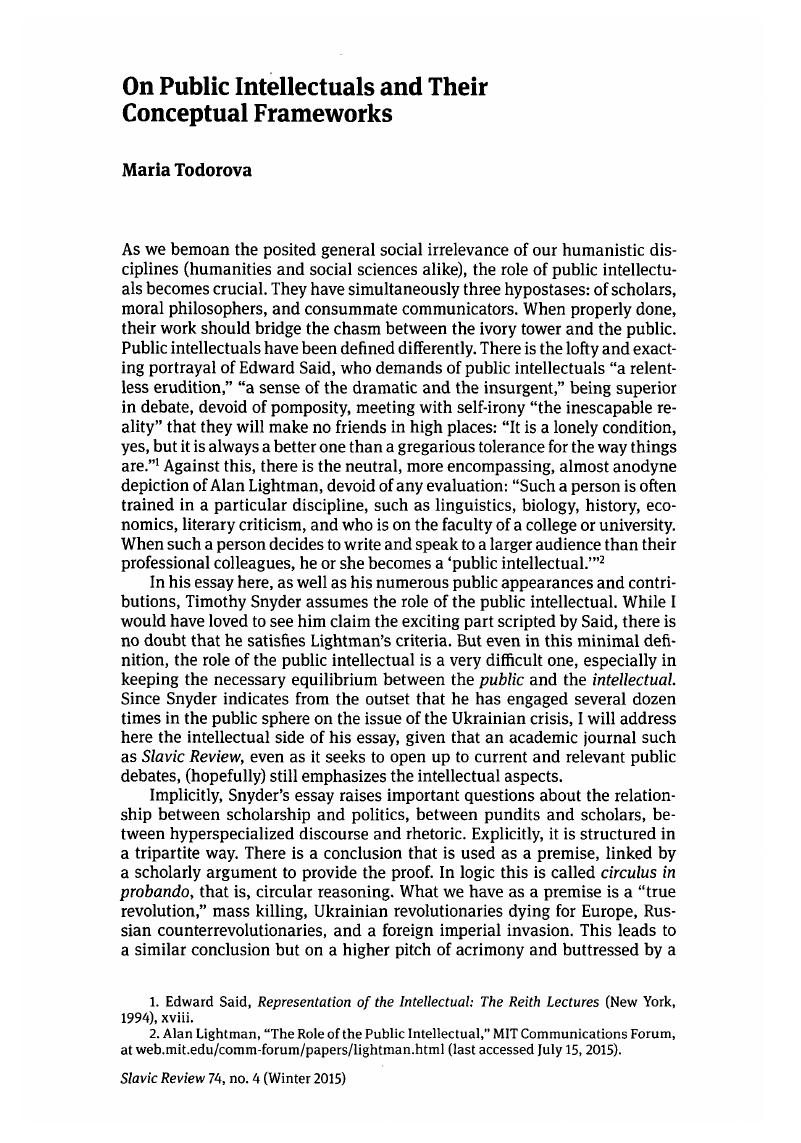Article contents
On Public Intellectuals and Their Conceptual Frameworks
Published online by Cambridge University Press: 20 January 2017
Abstract

- Type
- Critical Forum on Ukraine
- Information
- Copyright
- Copyright © Association for Slavic, East European, and Eurasian Studies. 2015
References
1 Edward, Said, Representation of the Intellectual: The Reith Lectures (New York, 1994)Google Scholar, xviii.
2 Alan Lightman, “The Role of the Public Intellectual,” MIT Communications Forum, at http://web.mit.edu/comm-forum/papers/lightman.html (last accessed July 15,2015).
3 Osterhammel, Jürgen, Colonialism: A Theoretical Overview, trans. Frisch, Shelley L. (Princeton, 2005)Google Scholar; Young, Robert J. C., Postcolonialism: An Historical Introduction (Oxford, 2001)Google Scholar; Butt, Daniel, “Colonialism and Postcolonialism,” in LaFollette, Hugh, ed., The International Encyclopedia of Ethics, 9 vols. (Oxford, 2013), 2:892–98Google Scholar; and Loomba, Ania, Colonialism/Postcolonialism (London, 2005)Google Scholar.
4 Loomba, Colonialism/Postcolonialism, 4. No wonder Ireland's status as a colony is open to debate in a lively historiography, but those who accept that definition limit it to the nineteenth century. See Terrence McDonough, , ed., Was Ireland a Colony? Economics, Politics and Culture in Nineteenth-Century Ireland (Dublin, 2005)Google Scholar; and Kenny, Kevin, ed., Ireland and the British Empire (Oxford, 2004)Google Scholar.
5 Todorova, Maria, “Balkanism and Postcolonialism, or On the Beauty of the Airplane View,” in Bradatan, Costica and Alex, Serguei. Oushakine, , eds., In Marx's Shadow: Knowledge, Power, and Intellectuals in Eastern Europe and Russia (Lanham, 2010), 175–95Google Scholar.
6 Deringil, Selim, ‘“They Live in a State of Nomadism and Savagery': The Late Ottoman Empire and the Post-Colonial Debate,” Comparative Studies in Society and History 45, no. 2 (April 2003): 311–42CrossRefGoogle Scholar.
7 The one exception, although also a matter of debate, is Bosnia-Herzegovina. See the convincing case made by Aleksov, Bojan, “Habsburg's ‘Colonial Experiment’ in Bosnia and Hercegovina Revisited,” in Brunnbauer, Ulf, Helmedach, Andreas, and Troebst, Stefan, eds., Schnittstellen: Festschrift für Eoln Sundhaussen (Munich, 2007), 201–16Google Scholar.
8 See, in particular, Geyer, Dietrich, Russian Imperialism: The Interaction of Domestic and Foreign Policy, 1860-1914 (New Haven, 1987)Google Scholar, who introduces the concept of “borrowed imperialism“; Brower, Daniel R. and Lazzerini, Edward J., eds., Russia's Orient: Imperial Borderlands and Peoples, 1700-1917 (Bloomington, 1997)Google Scholar; Weeks, Theodore R., Nation and State in Late Imperial Russia: Nationalism and Russification on the Western Frontier, 1863-1914 (DeKalb, 1996)Google Scholar; Osterhammel, Jürgen, “Russland und der Vergleich zwischen Imperien: Einige Anknüpfungspunkte,” Comparativ 18, no. 2 (2008): 11–26 Google Scholar; and Miller, Alexey, “The Value and the Limits of a Comparative Approach to the History of Contiguous Empires on the European Periphery,” in Matsuzato, Kimitaka, ed., Imperiology: From Empirical Knowledge to Discussing the Russian Empire (Sapporo, 2007), 19–32 Google Scholar.
9 For the Soviet Union, Khalid, Adeeb has made a comparable argument forcefully and convincingly in his “Backwardness and the Quest for Civilization: Early Soviet Central Asia in Comparative Perspective,” Slavic Review 65, no. 2 (Summer 2006): 231–51CrossRefGoogle Scholar. See also Bennigsen, Alexandre, “Colonization and Decolonization in the Soviet Union,” Journal of Contemporary History 4, no. 1 (1969): 141–51CrossRefGoogle Scholar; d'Encausse, Hélène Carrère, The End of the Soviet Empire: The Triumph of the Nations, trans. Philip, Franklin (London, 1993)Google Scholar; Suny, Ronald Grigor, The Revenge of the Past: Nationalism, Revolution, and the Collapse of the Soviet Union (Stanford, 1994)Google Scholar; and Strayer, Robert, “Decolonization, Democratization and Communist Reform: The Soviet Collapse in Comparative Perspective,” Journal of World History 12, no. 2 (Fall 2001): 375–406 CrossRefGoogle Scholar.
10 Spivak, Gayatri Chakravorty, “In Memoriam: Edward W. Said,” Comparative Studies of South Asia, Africa and the Middle East 23, nos. 1-2 (2003): 6–7 CrossRefGoogle Scholar; Bjelić, Dušan I. and Savić, Obrad, eds., Balkan as Metaphor: Between Globalization and Fragmentation (Cambridge, Mass., 2002)Google Scholar; and Jusdanis, Gregory, review of Imagining the Balkans, by Todorova, Maria, Journal of Modern Greek Studies 16, no. 2 (1998): 375–77CrossRefGoogle Scholar.
11 Connell, Liam, “Scottish Nationalism and the Colonial Vision of Scotland,” Interventions 6, no. 2 (June 2004): 252–63CrossRefGoogle Scholar.
- 4
- Cited by


